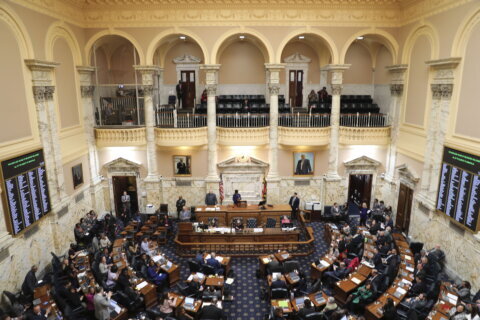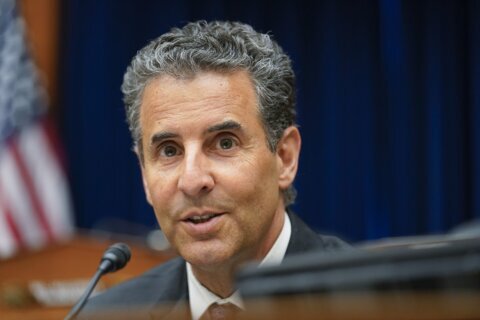▶ Watch Video: Congressional races heat up as Democrats try to flip Senate
Although much of the nation’s attention is focused on the race for the presidency between President Trump and Democratic nominee Joe Biden, there are also several toss-up Senate races this year that will determine whether the Senate remains in Republican hands or is taken by a Democratic majority.
To take the majority, Democrats would have to net three seats, should Joe Biden win the presidency, or four seats, if President Trump wins reelection, because it’s the vice president who breaks ties in the Senate. The current balance of the Republican-controlled Senate is 53 to 47.
Here is a rundown of the key Senate races in this year’s election, and the rules about processing absentee ballots:
Alabama

Many consider Democrat Doug Jones’ tenure as a senator from ruby-red Alabama to be a fluke. He won the seat in a 2017 special election to fill the vacancy left by Jeff Sessions, who became Mr. Trump’s first attorney general. Jones narrowly defeated Republican candidate Roy Moore, who faced multiple allegations of sexual misconduct with underage girls. This year, Jones is less fortunate in his opponent — he’s been challenged by Tommy Tuberville, the well-known, well-loved former coach of the Auburn University football team.
Alabama gave President Trump 30-point margin of victory in 2016, so Tuberville is expected to have a substantial advantage in this closely watched race. The Cook Political Report, a nonpartisan election analysis site, rates the outcome of the race as “Lean Republican.”
The likely outcome of Jones’ loss will mean Democrats need to win one more seat to gain the majority.
Arizona

Republican Senator Martha McSally was appointed to her position months after losing to Senator Kirsten Sinema by under three points in the race for the state’s other Senate seat in 2018. This year’s election is another test of whether she can win the state. This time she’s facing Democrat Mark Kelly, a former astronaut and the husband of former Congresswoman Gabby Giffords, a gun control activist who was shot in 2011.
McSally has been an ally of President Trump and appeared with him when he visited the state amid the coronavirus pandemic. His coattails could be shrinking in 2020, however. Mr. Trump won Arizona by about 3.5 points, while in 2012, Mitt Romney carried the state by 10 points against President Obama. Now, in the week before Election Day, CBS News’ Battleground Tracker shows Joe Biden with a five-point lead over Mr. Trump, 51% to 46%. The Cook Political Report rates this race as “Lean Democratic.”
Colorado

Incumbent first-term Senator Cory Gardner, a Republican, is locked in a tight race with former Governor John Hickenlooper. After a brief primary presidential bid, Hickenlooper decided to run for Senate. Gardner is considered one of the most vulnerable Republican senators up for reelection this year — he’s the only major statewide elected GOP official. Gardner has been trailing Hickenlooper in polls leading up to Election Day, and Cook Political Report rates this race as “Lean Democratic.”
Georgia

Georgia has two high-profile Senate races this year, thanks to a contentious special election. GOP Senator David Perdue is defending his seat from Democratic challenger Jon Ossoff, who ran for the House unsuccessfully a few years ago. Cook Political Report rates this race as a “Toss-up.”

Meanwhile, Republican Senator Kelly Loeffler is running to hang on to the seat that she was appointed to fill in December 2019 when Senator Johnny Isakson retired early. This special election has 21 candidates, but her main competition comes from GOP Congressman Doug Collins. Collins’ presence in the race means Loeffler is highly unlikely to win 50% of the votes, so the top two vote-getters will end up in a runoff that is scheduled to take place on January 5. The leading Democratic candidate, Reverend Raphael Warnock, has benefited from the internecine squabble among the Republicans, and may be one of the two top vote-getters to proceed to a runoff. Cook Political Report rates this race as a “Toss-up.”
Georgia election officials are sure to be trying to avoid a general election like their June primary, which was plagued by problems: hours-long lines, polling machine problems, staffing shortages, and general confusion. Absentee ballots can be counted beginning at 7 a.m. ET on Election Day. Ballots must be received by Election Day before polls close.
Iowa

Republican Senator Joni Ernst is being challenged by Democrat Theresa Greenfield in an unexpectedly close race. Mr. Trump won Iowa by 10 percentage points in 2016, raising concerns among Republicans about the tightness of a race Ernst was initially expected to win.
Greenfield has raised far more than Ernst — $28.7 million in the third quarter — and she could end up outspending Ernst by more than $25 million by Election Day.
Though Greenfield is a political neophyte, she has earned the endorsement of three Iowa newspapers, including the Des Moines Register, which said of the Iowa businesswoman, “Theresa Greenfield is not a practiced politician. That makes her all the more appealing to represent Iowans in the U.S. Senate.” The editorial board criticized Ernst for her support of the GOP tax cut, her defense of President Trump during his impeachment and for casting doubt on the count of people who have died of COVID-19.
Cook Political Report rates this race as a “Toss-up.”
Maine

Senator Susan Collins, running for her fifth term, is considered one of the most moderate Republicans in the Senate, but she is facing considerable skepticism from Democrats and independents who previously supported her.
Although she supports abortion rights, Collins voted in favor of Justice Brett Kavanaugh’s confirmation in 2018, despite his anti-abortion rights record. She was the lone Republican to vote against the confirmation of Supreme Court Justice Amy Coney Barrett. “I do not think it is fair nor consistent to have a Senate confirmation vote prior to the election,” she said.
Collins was considered one of the possible swing voters Mr. Trump’s impeachment trial, but ultimately she voted to acquit him. She said at the time she believed he had “learned” from the experience, putting her in the crosshairs of national Democrats.
State Speaker of the House Sara Gideon is the Democratic candidate, and has posted record fundraising. There have been no major polls yet showing Collins winning her reelection bid, though a couple have been close. Cook Political Report rates this race as a “Toss-up.”
Michigan

Michigan is a key battleground state in the presidential election as well as in the Senate, as Mr. Trump defeated Hillary Clinton by an incredibly narrow margin in 2016. First-term Democratic Senator Gary Peters is up for reelection and is running against Republican John James, who unsuccessfully ran for Senate in 2018.
James has outraised Peters, and Mr. Trump’s strong performance in the state has some national Democrats nervous. But polls have been showing Peters leading James, and Cook Political Report rates this race “Lean Democratic.”
Montana

First-term Republican Senator Steve Daines faces a challenge from the two-term governor of his state, Steve Bullock. Like Hickenlooper, Bullock briefly ran for president before ending his bid and entering the Senate race in March 2020. Bullock won reelection in Montana as a Democrat in 2016 even as Donald Trump won the state by about 20 points.
Cook Political Report rates this race as a “Toss-up.”
North Carolina

The closely- watched North Carolina Senate race has seen a couple of October surprises. Incumbent Senator Thom Tillis, a Republican, tested positive for COVID-19. Democrat Cal Cunningham became embroiled in a sex scandal. Neither development upended the race, which remains is extremely close.
Tillis is a member of the Judiciary Committee, and Cunningham has slammed the senator for reversing his position on filling a Supreme Court seat ahead of the election. The Cook Political Report is also calling rates this race as a “Toss-up.”
If it is close, we may have to wait a few days to find out the outcome, since absentee ballots postmarked by Election Day and received within three days afterward will be counted.
South Carolina

Senate Judiciary Committee Chairman Lindsey Graham is facing a closer than expected reelection race. Graham led the high-profile confirmation hearings for Judge Amy Coney Barrett to the Supreme Court, and Democrat Jaime Harrison is hitting him for his reversal on confirming a Supreme Court nominee in a presidential election year. Harrison is the former state Democratic Party chair, and an African American candidate in a state where 30% of the population is African American. The race has received a lot of national attention, giving Harrison a financial boost. Cook Political Report rates this race as a “Toss-up.”
Eleanor Watson, Aaron Navarro and Sarah Ewall-Wice contributed to this report.







